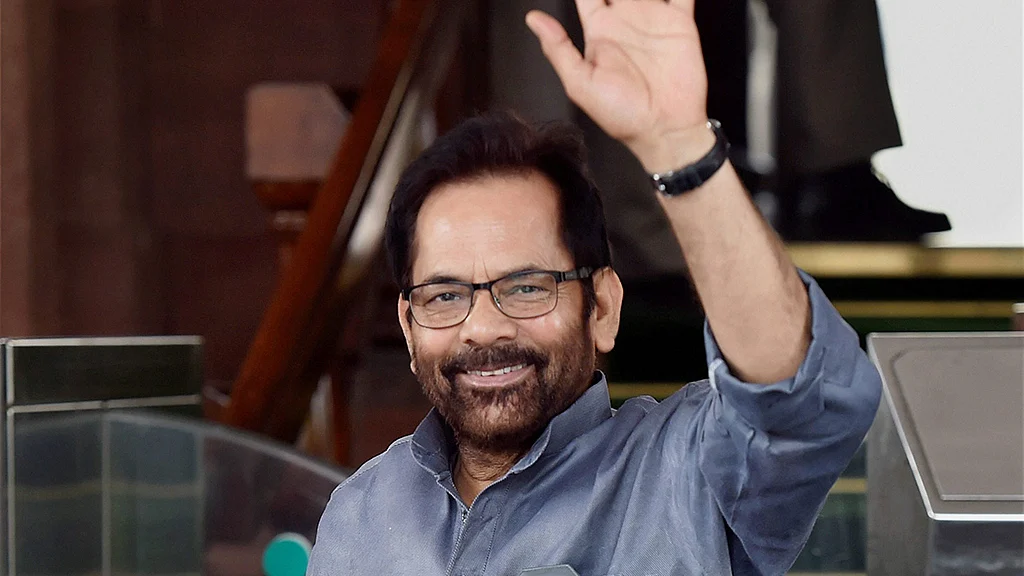Is Mukhtar Abbas Naqvi suffering from ‘SMS’?
<i>Sarkari Mussalman Syndrome</i> is what most Muslim ministers are said to suffer from. Naqvi seemed to be thus giving a loyalty test while denying lynching by Gau Rakshaks at Alwar

Despite his politics, I used to rather like Mukhtar Abbas Naqvi – a soft-spoken, slightly clownish and bumbling figure who gave the impression that even he did not take himself seriously. And when he said something silly – as politicians of a certain stripe are prone to – he seemed to say it with a knowing wink: Look guys, don’t take it to heart, I’m simply doing a hatchet job for my party.
But his cringing performance over the Alwar lynching episode – the horrific killing of an innocent Muslim dairy farmer, Pehlu Khan, by a group of cow vigilantes – has damaged his reputation big time, and he is likely to struggle to live it down.
Naqvi’s crass denial that such an incident had ever happened was bad enough; worse was the manner in which he responded to MPs concerns as though it was all a big joke. Rubbishing it as fake news a mocking Naqvi said: “Jis tarah ki ghatna pesh ki ja rahi hai, aisi koi ghatna zameen par nahi hui hai” (the kind of incident that is being presented has not occurred on the ground). And this after his own senior colleague, Home Minister Rajnath Singh, had acknowledged it and photographs and video footage of the incident were playing on TV channels even as he was dismissing it as fiction.
What, on earth, was he up to? Was he feigning ignorance? Or was he really ignorant? I don’t think it was either. Instead, there was something else at play here, I thought.
Muslims have a term for those of their brethren who, they believe, have dumped the community in order to climb the greasy pole of pelf and power. They refer to Muslim ministers and MPs as Sarkari Mussalman, a category of Muslim politicians who feel a constant need to affirm their loyalty to their political patrons. It is called the “Sarkari Mussalman Syndrome” (SMS), and has been found to be particularly acute among BJP’s Muslim politicians, especially ministers. And it really comes into play when the issue they’re dealing with involves Muslims.
A Sarkari Mussalman sees himself/herself as being on a 24/7 “loyalty test”, consumed by an overwhelming anxiety lest they fail the test. So, while a Hindu minister or party spokesperson can be forthright – even dare to deviate from party line – without looking over their shoulder, their Muslim colleague is always on tenterhooks. This prompts them often to behave in a shamelessly obsequious manner. And it was this that was at play in Naqvi’s case.
Thus, Rajnath Singh had no inhibition admitting that the ghastly incident had happened--and he even issued a proforma condemnation. Naqvi, on the other hand, was more concerned that “the message should not go out from this House that it supports cow slaughter “. Here’s what he said: “This is a very sensitive issue. A message should not go to the country from this House that we are supporting cow slaughter. The sentiments of crores of people are linked to this issue.”
Pardon? Taking note of and condemning the brutal killing of an innocent man by thuggish “gau rakshaks” amounts to sending out a message that Parliament “supports cow slaughter”? The truth is that Naqvi didn’t want facts to come in the way of his desire to please his party bosses. I’m trying to imagine whether he would have been equally cavalier had the victim been a Hindu and the thugs Muslim?
The SMS has a distinguished pedigree going back to the Congress’s heydays. Muslim ministers in Congress governments were always viewed with suspicion by the wider Muslim community. And these included famous Muslim leaders like Zakir Husain and Fakhruddin Ali Ahmed. They were seen as simply showpieces – more interested in keeping their jobs than protecting the community’s interests that they were supposed to represent.
I can’t think of a single Muslim minister ever bothering about the problems of the Muslim community. If anything, many – like Najma Heptullah – actively tried to distance themselves from the community. Her first act after becoming the Minister for Minorities Affairs was to wash her hands off Muslims.
“Muslims are not minorities… This is not the ministry for Muslim affairs, this is the Ministry for Minority Affairs,” she said when asked how her ministry proposed to tackle Muslim welfare.
The irony is that she built her entire political career on the strength of her Muslim identity; and as a representative of a minority community. If she were not a Muslim and had not so tirelessly flogged her Muslim minority tag, she might still have been struggling on the backbenches.
To be sure, this applies to all Sarkari Mussalmans in all parties, but as noted earlier the tension is more acute when it comes to BJP’s Muslim “leaders”. Lacking a base in their own community, and mostly isolated in the party which tolerates them only because they serve a purpose, they are always on an edge. Their future hangs by a slender loyalty thread which can snap at the slightest hint of a “wrong” move. Naqvi typifies this dilemma.
Meanwhile, I am dying to know how his performance went down in the party. Did he get a ‘shabashi’—a pat on the back for his brave act? Or was he ticked off for causing embarrassment to the leadership with his extreme show of loyalty? That’s the problem with SMS. You never know.
Hasan Suroor is an independent commentator.
This is an opinion piece and the views expressed above are the author’s own.
Follow us on: Facebook, Twitter, Google News, Instagram
Join our official telegram channel (@nationalherald) and stay updated with the latest headlines
